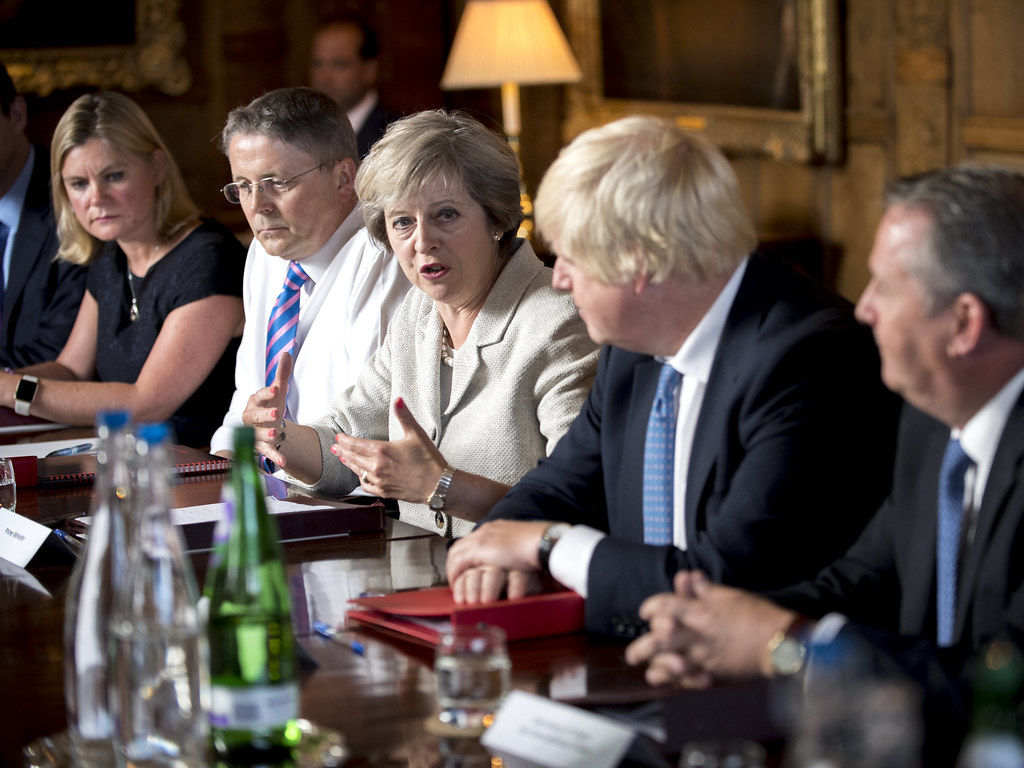In a fiery exchange at this week’s Prime Minister’s Questions, Labour’s Shadow Business Secretary Rebecca Long-Bailey told the government it was “running down the clock on our planet”.
She said “three current cabinet ministers have denied the scientific consensus on climate change” and pointed out that several of those vying to replace Theresa May as Prime Minister have “close links with organisations and individuals promoting climate denial.”
So, who was Long-Bailey talking about?
Leadership Contenders
Boris Johnson
Former Foreign Secretary and bookies’ favourite Boris Johnson has rejected climate science a number of times over the years.
In December 2015, following the signing of the Paris Agreement, Johnson wrote a column for the Daily Telegraph praising the work of notorious climate science denier and brother of the Labour leader, Piers Corbyn, who he called a “great physicist and meteorologist.”
“In the view of Piers and his colleagues at WeatherAction,” he wrote, “it is all about sun spots,” adding: “Whatever is happening to the weather at the moment, he said, it is nothing to do with the conventional doctrine of climate change.”
Johnson’s position has apparently changed since then, though, having recently come out in support of a “net zero” by 2050 emissions target.
And during his stint as Foreign Secretary, he said he would “continue to lobby the U.S. at all levels to continue to take climate change extremely seriously.” Whether he raised the issue in his phone call with Trump during his state visit to the UK remains unknown.
Johnson is nevertheless still closely tied to the UK‘s climate science denial network, having received a £25,000 donation from Terence Mordaunt, a director of the Global Warming Policy Forum, the campaign wing of the UK’s principal climate science denial group founded by Lord Nigel Lawson. First Corporate Shipping, which Mordaunt co-owns, donated to both Johnson and Hunt’s leadership campaigns, openDemocracy recently revealed.
Michael Gove
Another front-runner, Michael Gove, has made some bold statements on the need to tackle climate change since becoming Environment Secretary in 2017. That’s perhaps to shake off an image he obtained while Education Secretary as something of an anti-climate action advocate.
Gove gave a speech to environmental charity WWF shortly after his appointment as Environment Secretary in which he said he “deeply regretted President Trump’s approach towards the Paris Agreement on Climate Change” and has linked last summer’s heatwave to climate change. Like Johnson, he has also backed a “net zero” by 2050 emissions target.
But while Education Secretary, back in 2013, Gove caused outcry when he announced plans to exclude climate change from the geography national curriculum. The Energy Secretary at the time, Liberal Democrat Ed Davey, later wrote that Gove “couldn’t help playing to the Tory climate-sceptic audience.”
A year later, Gove said he had “read with concern” a report by Nigel Lawson’s climate science denying group the Global Warming Policy Foundation (GWPF), which accused “activist” teachers of trying to turn pupils into “foot soldiers of the green movement.” A spokesperson for Gove said at the time: “Schools should not teach that a particular political or ideological point of view is right.”
Gove is linked to other pro-Brexit, free market thinktanks based in and around 55 Tufton Street, too. An undercover investigation last year revealed Shanker Singham the director of international trade and competition at the Institute of Economic Affairs, a stone’s throw from Tufton Street, regularly speaks with Gove.
Singham, a former Washington lobbyist who has “unparalleled access” to UK ministers, ties to multiple US organisations known for promoting climate science denial, including the Koch-funded Heartland Institute and the Heritage Foundation.
Gove is also a board member of the New Culture Forum, a group led by former UKIP London Assembly leader Peter Whittle which aims to change cultural debates they believe are dominated by “the left”, which is based in 55 Tufton Street.
Andrea Leadsom
Andrea Leadsom, perhaps the person who can be credited with firing the starting gun on the Tory leadership battle in earnest with her cabinet resignation, has a chequered past when it comes to action on climate change.
Leadsom told the now defunct All Party Parliamentary Group on Unconventional Oil and Gas that when she took up her role as Energy and Climate Minister in May 2015 she had to ask whether climate change was real, being unsure herself.
She said at the time that she was now “completely persuaded” about the reality of climate change, however, and has announced that one of her priorities as Prime Minister would be to declare a “climate emergency,” arguing that the “clean growth technology sector is fast growing” and could be “bigger than the whole financial services sector.” Leadsom also supports reducing UK emissions to “net zero” by 2050.
Leadsom was something of an advocate for fossil fuels during her stretch at the former Department of Energy and Climate Change, though, where she enthusiastically worked to promote fracking in the UK, saying it was an opportunity “not to be missed.”
In a meeting with coal and steel industry representatives in February 2016, she assured them that the planned phase-out of coal by 2025 was “very much a consultation at this stage” and that Carbon Capture and Storage technology “has a potentially important role in the long-term decarbonisation of the UK.”
And back in 2008, the American Legislative Exchange Council paid for Andrea Leadsom to visit Washington and Chicago to attend meetings with the fossil fuel funded lobby group.
Dominic Raab
Raab was one of the first MPs to declare his intention to run in the leadership contest and has caused alarm with his suggestion of shutting down parliament to guarantee the UK leaves the EU on 31 October, with or without a deal.
The former Brexit Secretary has close ties to a number of pressure groups advocating a “no deal” Brexit, along with some of the UK’s most prominent climate science deniers.
He previously served on the political advisory board of Leave Means Leave, alongside fellow Conservative MP Owen Paterson, who has frequently spoken at events organised by the Global Warming Policy Foundation, where his brother-in-law and hereditary peer Matt Ridley sits on the advisory board.
Raab has also written numerous articles for the Taxpayers’ Alliance website, which campaigns for a low tax economy and forms part of the pro-Brexit, anti-climate network of free market groups based in and around 55 Tufton Street.
Raab has, however, backed the proposed “net zero” by 2050 emissions reduction goal.
Jeremy Hunt
Probably best known for introducing a controversial new contract for junior doctors during his time as Health Secretary, the now Foreign Secretary Jeremy Hunt is another candidate with a mixed record when it comes to climate change.
Hunt supports a target of “net zero” emissions by 2050 and, writing in The Observer recently, said he had “spent countless hours” on the UK’s bid to host the 2020 UN climate summit, COP 26, touting the conference as a chance to “use our convening power for good on this most important of issues”.
And on an official visit to Africa in May, Hunt warned that climate change could have a “catastrophic impact on hundreds of millions of people across Nigeria, the Sahel and more widely across Africa, and indeed the world, hitting the poorest and most vulnerable the hardest.”
It’s slightly surprising, then, that one of Hunt’s major financial backers turned out to be Terence Mordaunt, a director of the climate science denying Global Warming Policy Forum, who has given £25,000 to Boris Johnson‘s leadership bid, too.
Hunt has also been a strong supporter of fracking in the UK, arguing in a post on his website that the “safe development of shale gas will be good for jobs, good for our energy security, and help the UK to decarbonise its economy”.
Steve Baker
Baker has said he will stand in the Conservative leadership contest if none of the other candidates sign up to a no-deal Brexit plan drawn up by Eurosceptics.
An arch-Brexiteer and former Brexit Minister, Baker wrote a post for ConservativeHome in 2010 entitled “The greatest threat to civilisation is not climate change but bad economics.” In the article, he said: “Climate science does appear to be subject to uncertainties and climate change appears to be a problem we face in the medium to long term.”
Following the 2015 general election, Baker co-founded Conservatives for Britain, an anti-EU pressure group within the Conservative Party which he currently co-chairs. Its president is Nigel Lawson, whose climate science denying Global Warming Policy Foundation is based at 55 Tufton Street.
As Brexit Minister, Baker also met regularly with Shanker Singham of the Institute of Economic Affairs, whose director Mark Littlewood admitted to an undercover reporter from Greenpeace’s investigative unit last year that he had been used as a “slight shill” to hide some of Singham’s meetings with Baker.
Other Cabinet Members
Liam Fox
International Trade Secretary Liam Fox insists he takes climate change seriously, tweeting in April that there is a “clear scientific consensus on climate change, which I fully respect.” But he also has a patchy history of translating such words into action.
Fox appointed two trustees of climate science denial campaign group, the Global Warming Policy Foundation to his five-member “Brexit committee” in 2017: Lord Peter Lilley and Ruth Lea.
And in February he assured an oil and gas conference that they could rely on the government’s continued support: “We must focus on a low carbon future but the simple fact is that for the moment, we do require fossil fuels to deliver secure and affordable energy.”
Fox has close ties to fossil fuel funded lobby groups advocating deregulation and promoting climate science denial in the US. He gave the 10th “Margaret Thatcher Freedom Lecture” at the Heritage Foundation in 2018 and met with the Exxon-funded American Enterprise Institute during a 2017 trip to the US.
Fox’s Atlantic Bridge thinktank, which was forced to dissolve in 2011 following a Charity Commission investigation, also had a formal partnership with the American Legislative Exchange Council, known for pushing template bills across the US which undermine environmental protections.
Fox is not currently in the running for Conservative leader.
Philip Hammond
Chancellor of the Exchequer Philip Hammond has not declared his intention to replace Theresa May, but could yet prove an important ally to many candidates.
Hammond may push for action on climate change at international finance meetings – and has shown no signs of being a climate science denier – but he provoked criticism from climate campaigners in a recent letter to the PM, saying the UK’s efforts to cut emissions to “net zero” by 2050 could cost £1 trillion.
The Shadow Energy and Climate Minister Alan Whitehead hit back calling the intervention a “calculated attempt to delay or halt” the target becoming law. Whitehead argues the figure is based on a “fundamental misreading of the costs of climate action against benefits, or indeed impacts of inaction”, confusing government spending for investment which generates a return.
And 10 Downing Street disowned Hammond’s analysis, saying the government’s plans would cost no more than the UK’s existing plans to reduce greenhouse gas emissions.
Photo credit: Number 10/Flickr/CC BY–NC–ND 2.0 Updated on 08/06/2019 to include statement from Andrea Leadsom on climate emergency as well as support for net zero emissions goal, alongside Johnson, Gove and Raab. Updated again on 21/06/2019 to include news of Terence Mordaunt donations and section on Jeremy Hunt.
Subscribe to our newsletter
Stay up to date with DeSmog news and alerts







